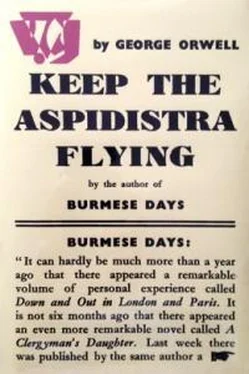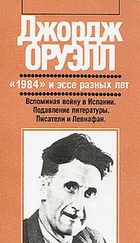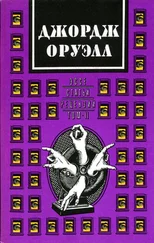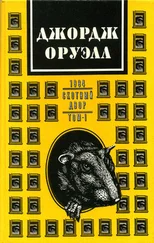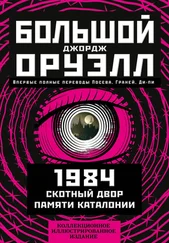A refaned, adenoidal feminine voice answered him: 'Who's thyah, please?'
He pressed Button A. So the die was cast.
'Is Miss Waterlow in?'
'Who's THYAH, please?'
'Say it's Mr Comstock. She'll know. Is she at home?'
'Ay'll see. Hold the lane, please.'
A pause.
'Hullo! Is that you, Gordon?'
'Hullo! Hullo! Is that you, Rosemary? I just wanted to tell you. I've thought it over—I've made up my mind.'
'Oh!' There was another pause. With difficulty mastering her voice, she added: 'Well, what did you decide?'
'It's all right. I'll take the job—if they'll give it me, that is.'
'Oh, Gordon, I'm so glad! You're not angry with me? You don't feel I've sort of bullied you into it?'
'No, it's all right. It's the only thing I can do. I've thought everything out. I'll go up to the office and see them tomorrow.'
'I AM so glad!'
'Of course, I'm assuming they'll give me the job. But I suppose they will, after what old Erskine said.'
'I'm sure they will. But, Gordon, there's just one thing. You will go there nicely dressed, won't you? It might make a lot of difference.'
'I know. I'll have to get my best suit out of pawn. Ravelston will lend me the money.'
'Never mind about Ravelston. I'll lend you the money. I've got four pounds put away. I'll run out and wire it you before the post–office shuts. I expect you'll want some new shoes and a new tie as well. And, oh, Gordon!'
'What?'
'Wear a hat when you go up to the office, won't you? It looks better, wearing a hat.'
'A hat! God! I haven't worn a hat for two years. Must I?'
'Well—it does look more business–like, doesn't it?'
'Oh, all right. A bowler hat, even, if you think I ought.'
'I think a soft hat would do. But get your hair cut, won't you, there's a dear?'
'Yes, don't you worry. I'll be a smart young business man. Well groomed, and all that.'
'Thanks ever so, Gordon dear. I must run out and wire that money. Good night and good luck.'
'Good night.'
He came out of the booth. So that was that. He had torn it now, right enough.
He walked rapidly away. What had he done? Chucked up the sponge! Broken all his oaths! His long and lonely war had ended in ignominious defeat. Circumcise ye your foreskins, saith the Lord. He was coming back to the fold, repentant. He seemed to be walking faster than usual. There was a peculiar sensation, an actual physical sensation, in his heart, in his limbs, all over him. What was it? Shame, misery, despair? Rage at being back in the clutch of money? Boredom when he thought of the deadly future? He dragged the sensation forth, faced it, examined it. It was relief.
Yes, that was the truth of it. Now that the thing was done he felt nothing but relief; relief that now at last he had finished with dirt, cold, hunger, and loneliness and could get back to decent, fully human life. His resolutions, now that he had broken them, seemed nothing but a frightful weight that he had cast off. Moreover, he was aware that he was only fulfilling his destiny. In some corner of his mind he had always known that this would happen. He thought of the day when he had given them notice at the New Albion; and Mr Erskine's kind, red, beefish face, gently counselling him not to chuck up a 'good' job for nothing. How bitterly he had sworn, then, that he was done with 'good' jobs for ever! Yet it was foredoomed that he should come back, and he had known it even then. And it was not merely because of Rosemary and the baby that he had done it. That was the obvious cause, the precipitating cause, but even without it the end would have been the same; if there had been no baby to think about, something else would have forced his hand. For it was what, in his secret heart, he had desired.
After all he did not lack vitality, and that moneyless existence to which he had condemned himself had thrust him ruthlessly out of the stream of life. He looked back over the last two frightful years. He had blasphemed against money, rebelled against money, tried to live like an anchorite outside the money–world; and it had brought him not only misery, but also a frightful emptiness, an inescapable sense of futility. To abjure money is to abjure life. Be not righteous over much; why shouldst thou die before thy time? Now he was back in the money–world, or soon would be. Tomorrow he would go up to the New Albion, in his best suit and overcoat (he must remember to get his overcoat out of pawn at the same time as his suit), in homburg hat of the correct gutter–crawling pattern, neatly shaved and with his hair cut short. He would be as though born anew. The sluttish poet of today would be hardly recognizable in the natty young business man of tomorrow. They would take him back, right enough; he had the talent they needed. He would buckle to work, sell his soul, and hold down his job.
And what about the future? Perhaps it would turn out that these last two years had not left much mark upon him. They were merely a gap, a small setback in his career. Quite quickly, now that he had taken the first step, he would develop the cynical, blinkered business mentality. He would forget his fine disgusts, cease to rage against the tyranny of money—cease to be aware of it, even— cease to squirm at the ads for Bovex and Breakfast Crisps. He would sell his soul so utterly that he would forget it had ever been his. He would get married, settle down, prosper moderately, push a pram, have a villa and a radio and an aspidistra. He would be a law–abiding little cit like any other law–abiding little cit— a soldier in the strap–hanging army. Probably it was better so.
He slowed his pace a little. He was thirty and there was grey in his hair, yet he had a queer feeling that he had only just grown up. It occurred to him that he was merely repeating the destiny of every human being. Everyone rebels against the money–code, and everyone sooner or later surrenders. He had kept up his rebellion a little longer than most, that was all. And he had made such a wretched failure of it! He wondered whether every anchorite in his dismal cell pines secretly to be back in the world of men. Perhaps there were a few who did not. Somebody or other had said that the modern world is only habitable by saints and scoundrels. He, Gordon, wasn't a saint. Better, then, to be an unpretending scoundrel along with the others. It was what he had secretly pined for; now that he had acknowledged his desire and surrendered to it, he was at peace.
He was making roughly in the direction of home. He looked up at the houses he was passing. It was a street he did not know. Oldish houses, mean–looking and rather dark, let off in flatlets and single rooms for the most part. Railed areas, smoke–grimed bricks, whited steps, dingy lace curtains. 'Apartments' cards in half the windows, aspidistras in nearly all. A typical lower– middle–class street. But not, on the whole, the kind of street that he wanted to see blown to hell by bombs.
He wondered about the people in houses like those. They would be, for example, small clerks, shop–assistants, commercial travellers, insurance touts, tram conductors. Did THEY know that they were only puppets dancing when money pulled the strings? You bet they didn't. And if they did, what would they care? They were too busy being born, being married, begetting, working, dying. It mightn't be a bad thing, if you could manage it, to feel yourself one of them, one of the ruck of men. Our civilization is founded on greed and fear, but in the lives of common men the greed and fear are mysteriously transmuted into something nobler. The lower–middle– class people in there, behind their lace curtains, with their children and their scraps of furniture and their aspidistras—they lived by the money–code, sure enough, and yet they contrived to keep their decency. The money–code as they interpreted it was not merely cynical and hoggish. They had their standards, their inviolable points of honour. They 'kept themselves respectable'— kept the aspidistra flying. Besides, they were ALIVE. They were bound up in the bundle of life. They begot children, which is what the saints and the soul–savers never by any chance do.
Читать дальше
